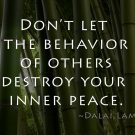Help Others More Effectively
Do you have someone in your family who just can’t seem to get their life together? You might have family members who won’t engage in healthy behaviors, are depressed, and are often addicts.
Do you find yourself worrying about them so much that it is taking away from your enjoyment of life? Do you feel compelled to help, yet frustrated, hopeless and helpless about the situation?
If so, you are not alone. I regularly talk with anxious caretakers who want me to help their loved ones. Some realize that they would be more effective as caretakers if
Read MoreFrom Trauma Drama to Ease in Relationships
I have a client who had 2 difficult housemates and didn’t feel like he could move. He called them entitled, and he felt like they regularly demanded far more from him than they were willing to do themselves. He often felt enraged, like a seething volcano about ready to erupt! He didn’t feel like he knew how to react to these kinds of stressful relationships!
He felt resentful because he was doing a large majority of the shared responsibilities. He was very concerned about saying something because he felt that, no matter how respectful he tried to be, they had a pattern of lashing out, being vindictive, or undermining his needs.
Read MoreWhat Makes Men Violent?
When I heard about the last mass shooting in Vegas, I felt physically ill. If the shooter was a Muslim or anything other than White, the media and politicians would label him as a terrorist.
If the shooter is White, they say that he has mental health issues.
But what has been the common denominator in 88 out of the last 91 shootings? It is that the shooter is a male.
While most men are not violent, most of the violence is committed by men. In fact, 90% of homicides are by men. And it is time that we as a country start to address the underlying causes before more lives are lost!
So what makes men violent?
Read MoreThe Power of Our Friend’s Subconscious Influence
We have all probably noticed the subtle influence we get from our friends. Maybe they want a beer after a hike, desert after a meal, or maybe they just got a cool new phone. At some point, you are likely to want what they have. These social influences are much more powerful than we realize, and as a healer, I regularly see the profound impact of our environment. The messages we receive implicitly or explicitly shape who we are and how we think, and one of the most powerful ways to improve as a person is to be picky about who you spend time with.
What evidence is there to suggest that who we surround ourselves with matters?
Read MoreWhy People are Cruel
I used to keep abreast of the news, but I find that I no longer can. Why? Because the news is barraged with reports of things cruel people said, cruel people did or cruel new laws that were passed, and I’m finding it too distressing to follow closely.
Similarly, I’ve noticed in my personal life and as a Holistic Brain Health practitioner, cruelty seems to be on the rise.
I was thinking this as I discovered the latest issue of Psychology Today, where the featured article discussed the rise of toxic behavior. According to the global communications firm Weber Shandwick, a record number of Americans (69% ) believe that American has a civility problem. It was 65% is 2010.
So what is causing the increase in cruelty?
According to the research by Weber Shandwick, most people blame politicians and social media. As I wrote in my article Why We Lack Control Over Our Thoughts, our environment and what we are exposed to has a profound influence on what we think. If we have any tendency to be cruel, the cruelty we see regularly in the news, in our social media and entertainment gives us unconscious permission to do the same. We are not immune from our environment. If we were, politicians and advertisers wouldn’t spend as much as they do trying to influence us.
That being said, we don’t all respond to watching cruelty in the same way.
Interestingly, in a study published in 2014, researchers showed that watching violence activates the brains differently in aggressive people than calm people. Aggressive people had reduced activity in the decision making part of their brain (the orbitofrontal cortex), and more activity in the emotional center of the brain (the amygdala). They also showed a rise in blood pressure.
So if aggressive people respond differently to watching violence than calm people, what makes people unkind in the first place?
Read MoreA Powerful Strategy to Become the Best You
As I child I was told early on that I asked too many questions and had too many needs. My father was constantly angry, and he told me it was my responsibility to not make him so. So my response was to belittle my needs, and try to be less demanding.
Recently, I found myself in a similar pattern in a project I was working on, where I felt like I was walking on eggshells to fulfill the needs of someone else. I dismissed my own needs in favor of theirs and began getting resentful.
Yet I am a firm believer that we need to stand up for our rights and what we believe in, and that if we stay silent, we will lose our voice and our power.
I realized that I am caught in this conflict of not knowing, when is it OK to speak up, and when is it better to shut up?
I’ve recently noticed the pattern that people with healthier relationships do speak up. They feel more entitled to being treated well than I do, and there is even research to support this.
I was in the midst of pondering this conundrum, when I showed up for my yoga class. The teacher talked about setting an intention for our practice, but said that to face our current times, we need something deeper, something more long lasting, we need to concept of the sankalpa.
What is the sankalpa?
Read More








